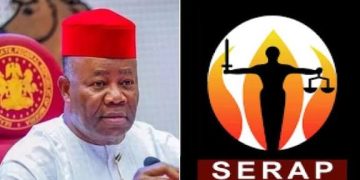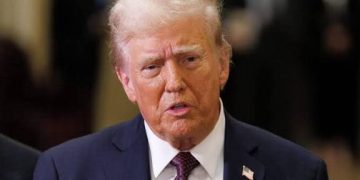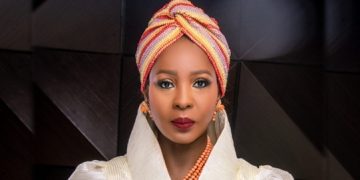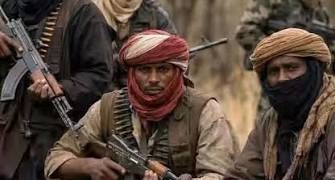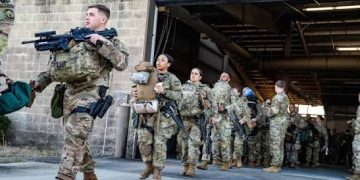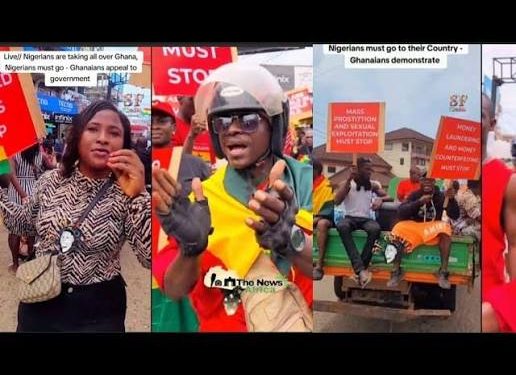Nigerians have increasingly become targets in countries such as South Africa, Ghana, and other African nations for various reasons often linked to their remarkable success and prosperity in many areas of life. Yet, paradoxically, the Western world has found it possible to accommodate Nigerians. Why, then, do some African countries appear to harbor resentment or hostility toward Nigerians?
Protests in Ghana calling for the deportation of Nigerians have reignited debate over national law, regional integration, and human rights in West Africa.
In July 2025, Ghanaian traders marched through Accra, holding placards with messages such as “Nigerians Must Go,” “End Kidnapping,” and “Who Protects the Rights and Freedom of Ghanaians?” The demonstrators accused some Nigerians of fueling crime, including cyber fraud, ritual killings, armed robbery, and prostitution.
The protests, however, raise serious concerns about xenophobia, collective punishment, and violations of international human rights obligations.
At the heart of the dispute lies Ghana’s Ghana Investment Promotion Council (GIPC) Act, which restricts foreigners from engaging in retail trade unless they invest at least $1 million and employ 12 Ghanaian citizens. The law is designed to shield local traders from foreign competition.
Yet some Nigerians, invoking ECOWAS free movement protocols, have been accused of sidestepping these regulations, triggering resentment among Ghanaian traders. The ECOWAS Protocol on Free Movement of Persons, Residence and Establishment grants citizens of member states the right to reside and work across borders, but it does not override national laws regulating investment and retail. This gap has fueled frequent clashes.
Globally, frameworks like the United Nations Commission on International Trade Law (UNCITRAL) and the United Nations Conference on Trade and Development (UNCTAD) seek to harmonize trade practices and discourage discriminatory restrictions. Ghana’s protests, which single out Nigerians collectively, risk undermining both these principles and the spirit of ECOWAS integration.
More critically, the protests highlight xenophobic undertones. The African Charter on Human and Peoples’ Rights guarantees freedom from discrimination, the right to dignity, and freedom of movement. The International Covenant on Civil and Political Rights (ICCPR) further prohibits collective punishment. By painting all Nigerians as criminals, the rhetoric of “Nigerians Must Go” breaches these protections and promotes ethnic scapegoating.
This is not the first time tensions have flared. In 1983, Nigeria deported nearly one million Ghanaians and other West Africans amid economic hardship, a move that still lingers in regional memory. Ghana’s protests against Nigerians risk reopening old wounds at a time when West Africa needs greater solidarity, not division.
Protecting citizens from crime is a legitimate government duty. But justice must be pursued through due process, not collective vilification. Criminal cases involving Nigerians or any foreign nationals should be handled individually and fairly in court.
In August 2025, Ghanaian President John Mahama reassured a Nigerian envoy that “there is no place for xenophobia in Ghana.” For that promise to hold, both Ghana and Nigeria must work with ECOWAS.
The true measure of stability in any nation lies not only in its economy but in how it treats both citizens and foreign residents. For Nigerians abroad, safety and dignity must never be compromised by xenophobia. For Ghana, enforcing its laws must not override its commitments under ECOWAS, the African Charter, and international human rights conventions.
Daniel Okonkwo is a writer, human rights advocate, and public affairs analyst. He is the founder of Profile International Human Rights Advocate and has published more than 1,000 articles, many of which have appeared in Sahara Reporters and other outlets. He is also a professional transcriptionist, petitionist, ghostwriter, and freelancer.


